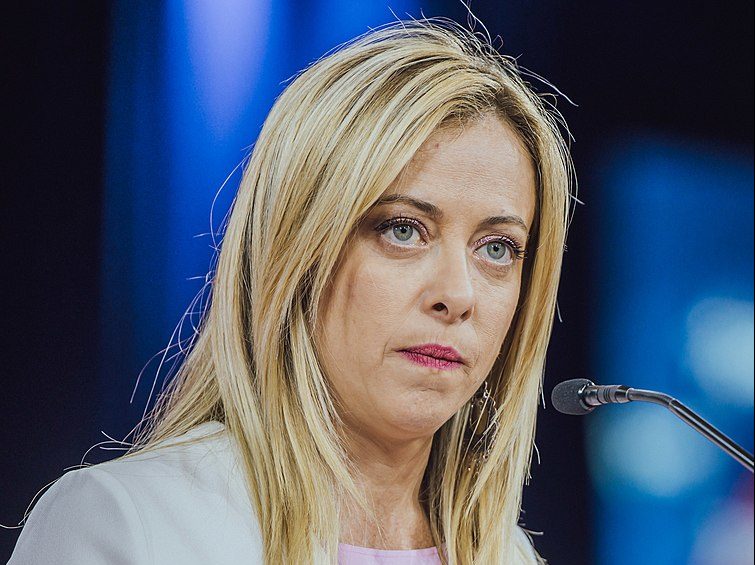Australia/Israel Review
Europa Europa: When in Rome…
Aug 31, 2022 | Alex Benjamin

I’m writing this after having returned from a much-needed holiday with my better half in Rome. There are many things the Italians do well – fashion, food and Frascati to name but three. But the city is dirty and covered in graffiti. I don’t mind the last as it is often instructive.
I spend a lot of time in various countries in Europe and always look at the walls to gauge the barometer of tolerance and dissent. Graffiti is how the disaffected and disenfranchised express themselves, after all. Often it makes no sense, nicknames or references to various crews or gangs. But other times it gives me a sense of the health of a democracy.
In Poland, for instance, I disturbingly see a lot of Stars of David crossed out, particularly in the countryside. In Prague, it’s usually political. In Montenegro, there’s a fair amount of pro-Serbian graffiti written in the Cyrillic alphabet. In Rome, alarmingly, I saw what I regarded as a disproportionate amount of SS symbols besides the name of the local football team Lazio. Of course, this is purely anecdotal, but I couldn’t help feeling, and I’ve spent a lot of time in Germany, that nobody would so brazenly reconjure the spectre of the SS on a wall in Berlin. Even if they did, authorities would have it cleaned up so quickly, it would be gone before your disbelieving eyes returned for a second look.
Neuroscientist and author David Eagleman famously noted that everyone dies three times: after their last breath, at their burial, and lastly, when their name is no longer spoken by anyone ever again. When in Germany, I get the feeling that they are at stage 3 when it comes to the Nazis: let us never speak of them again.
And yet, Italy, home to the second-most famous fascist leader of all time, appears to be on the cusp of electing a Prime Minister who once praised Benito Mussolini as “a good politician, the best in the last 50 years.” She has also praised as a hero Giorgio Almirante, the founder of the party from which her own party descends, but also a Nazi collaborator and editor-in-chief of the antisemitic and racist magazine, La Difesa della Razza, which published the “Manifesto of Race” in 1938.
Without even a hint of irony, Giorgia Meloni heads up the Fratelli d’Italia (“Brothers of Italy”) party, which includes amongst its ranks descendants of Benito Mussolini, as well as many others whose nostalgia for the Italian Fascist past is troubling, to say the least.
She is riding high in the polls, and her alliance with the Lega Nord, led by Mateo Salvini, looks set to capture the most seats in elections scheduled for Sept. 25, handing her the Prime Ministership. Her posters are all over Rome, and she stands ready, according to the strapline, to “Revive Italy”. “Revive what exactly?” I asked my wife as we rounded a piazza to find yet another poster coming into view.
It is worth remembering that until this latest crisis in Italian politics, Italy had really and truly turned a corner politically and reputationally under Mario Draghi, the former European Central Bank Chairman, who saved the euro countless times. Draghi is someone who straddles the sweet spot between the ego of France’s Macron and the blandness of Germany’s Scholz, and had put Italy back in the pantheon of European power-brokers. But Draghi’s achievements look set to be short-lived.
In an attempt to placate the fears of those who describe the Brothers of Italy as “neo-fascist” or far-right, including real fears within the European Commission that she could lead Italy towards the “illiberal democracy” of Hungary under Viktor Orbán, Meloni has told the foreign press that Italian Fascism is history.
Yet in Italy there is none of that all-pervading sense of shame one finds in Germany, no third stage in the trilogy of death that I spoke about earlier. Meloni’s memoirs, her hostility to migrants, gays and lesbians, is in plain sight, as is her desire to protect Italy’s “Christian heritage”.
In August, she again repeated her claim that Italian Fascism is the past and decried the anti-Jewish laws that the Fascists introduced. But if I were an Italian Jew, I wouldn’t be able to reconcile this position with the adulation she has for her ‘heroes’ – the very same people who brought in those laws. I would be worried.
I would be worried because it’s one thing to see some unpleasant graffiti on a wall and put it down to the disaffection of a minority, but when the sinister undercurrent of the graffiti moves from scratches on a wall to the town square, to a political manifesto, and ultimately perhaps to the highest political office in Italy, it is a sign that a country has refused to learn the lessons of the past. Instead, it appears – incredibly – to be on the cusp of embracing them again.






